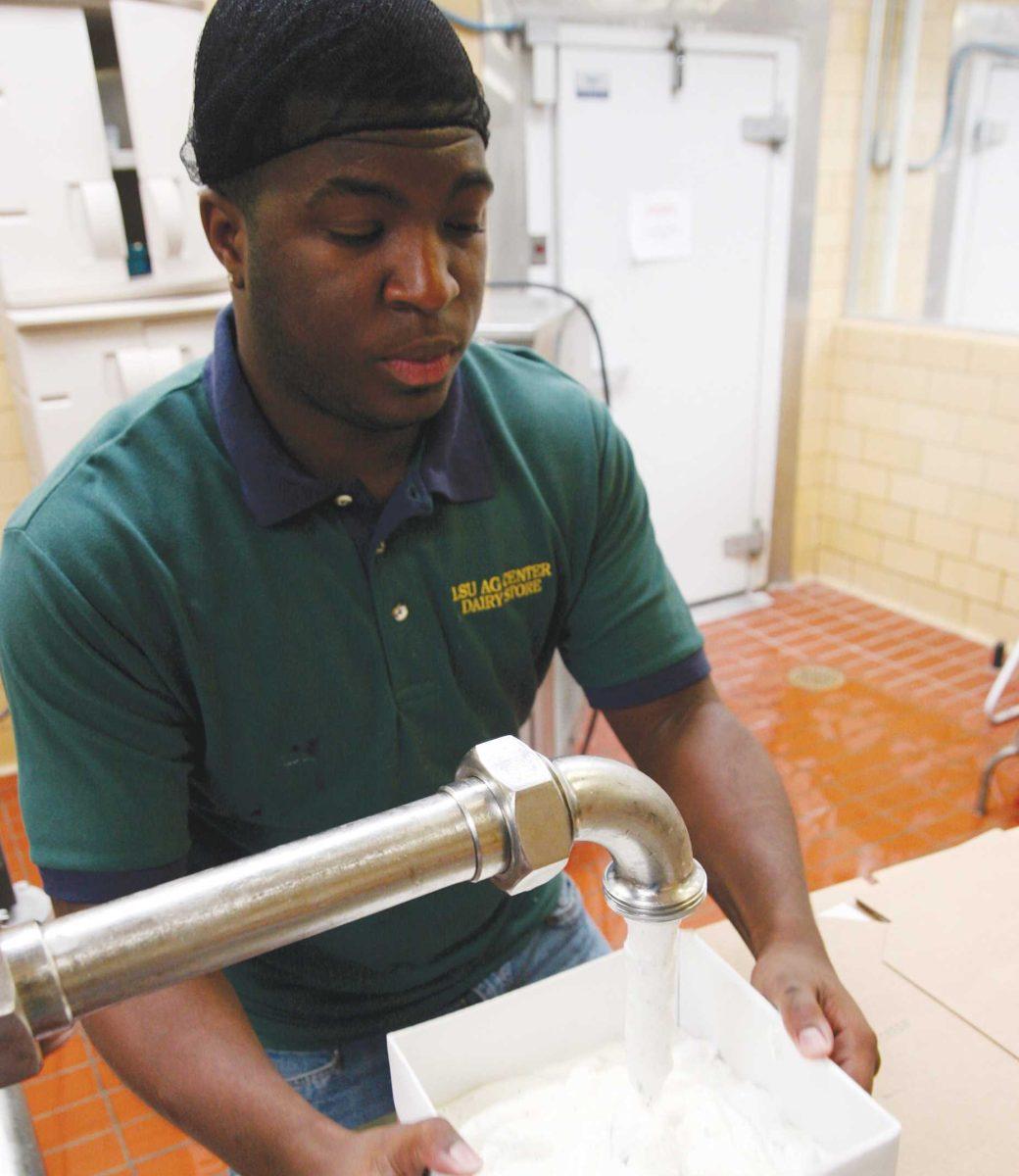Some students boost their income in college by restacking books in Middleton Library, serving coffee at the Student Union’s coffee shop or researching for their favorite professor.But David Cradic, dairy science senior, stands next to the operating table at the School of Veterinary Medicine, learning from his mentors and earning some extra cash between classes.”We prep the animals for surgery, and we clean the site where the incision is going to be and get them ready,” he said. “I keep everything stocked in all the surgeries, and once everything is stocked, I open things steadily and hand them off to the doctors.”Cradic, who just applied for Vet School, landed a job working in surgery a year and half ago, making about $7 an hour. Now Cradic spends his days in the operating room with everything from dogs to horses.Like Cradic, thousands of students are employed on campus for convenience. But because of budget cuts, some departments may be forced to cut back student workers’ hours and positions.”Different departments have different ways to pay workers,” said Sara Crow, Career Services assistant director of communications. “Some do come out of budget, and there are budget cuts campus wide. We don’t know what student workers are getting cut.”Most campus jobs typically pay minimum wage with slight raises, but because students are limited to 20 hours a week with no extra shifts or tips, students mainly decide to obtain campus jobs to cut back on commuting time from campus to other community jobs, Crow said.”I live right off campus, so in the mornings, I walk to campus, go to class, and then I walk to the Vet School.” Cradic said “It’s just really convenient to be right there, and going between class and work isn’t a big deal.”Students with work-study funding or Chancellor’s Aide can work up 20 hours a week until they exhaust their funding, but Crow said this varies by the department and its budget. Students participating in the work-study program can earn up to $2,400 per year.Remy Leger, geology senior, spends his time between classes scooping ice cream and blending shakes at the campus Dairy Store earning $7 an hour.”It’s easy to go from class to [work], and from your job back to class,” he said. “It’s also very flexible. They know you’re a student, so [employers] work with you and your schedule.”Crow said finding available jobs can be difficult. Departments generally look for students with work-study funds or Chancellor’s Aide because it helps with already slim departmental budgets.For the 2008-09 school year, the Office of Undergraduate Admissions and Student Aid placed about 880 students in federal work-study jobs with 835 of those on-campus. There are 1,820 students placed in on-campus jobs with the Chancellor’s Student Aide program.”I think there’s a lot of confusion whether students have [Chancellor’s aide] or not,” Crow said. “If you have Chancellor’s Aide, typically you know. It’s usually not one of those hidden things you have and you don’t know you have it.”But for those students without work-study funds or Chancellor’s Aide, they may have better luck finding a job at one of the larger student employers on campus including dining services, the Union office, the Faculty Club, University Recreation or the Union Bookstore.Tricia Milford-Hoyt, University Recreation assistant director of marketing and membership, said multiple hiring opportunities arise during the years.”Over the last few years, the word has gotten out that UREC is a great place to work so, we have had a lot of applications,” Milford-Hoyt said. “The main hiring pool will go on during April and May.”University Recreation employs more than 150 students each semester. Students start by making minimum wage but can work their way up to $20 an hour, Milford-Hoyt said.But because Union construction isn’t expected to be complete until 2012, fewer job opportunities are available for students, said Barbara Long, Union personal director.”We used to get a tremendous amount of applications,” Long said. “But a lot of the building is not even available for use, and that’s one thing that slows down the need for extra student workers.”Tiger Lair and the Union bookstore are privatized, so they take away once-available student jobs. Now, the Student Union typically offers jobs at the information desk or art gallery, Long said.Despite budget cuts, Crystal Oubre, assistant director of Undergraduate Admission and Student Aid, said some departments have requested more student positions on campus because students play “a vital role” at the University.”What’s ultimately important is for students to get work experience whether that’s on campus or outside,” Crow said. “We’re kind of lucky that although the economy is weak right now, Louisiana tends to be one of the better places to ride this out.”—-Contact Leslie Presnall at lpresnall@lsureveille.com
Budget cuts could force student-workers out of jobs
February 2, 2009





